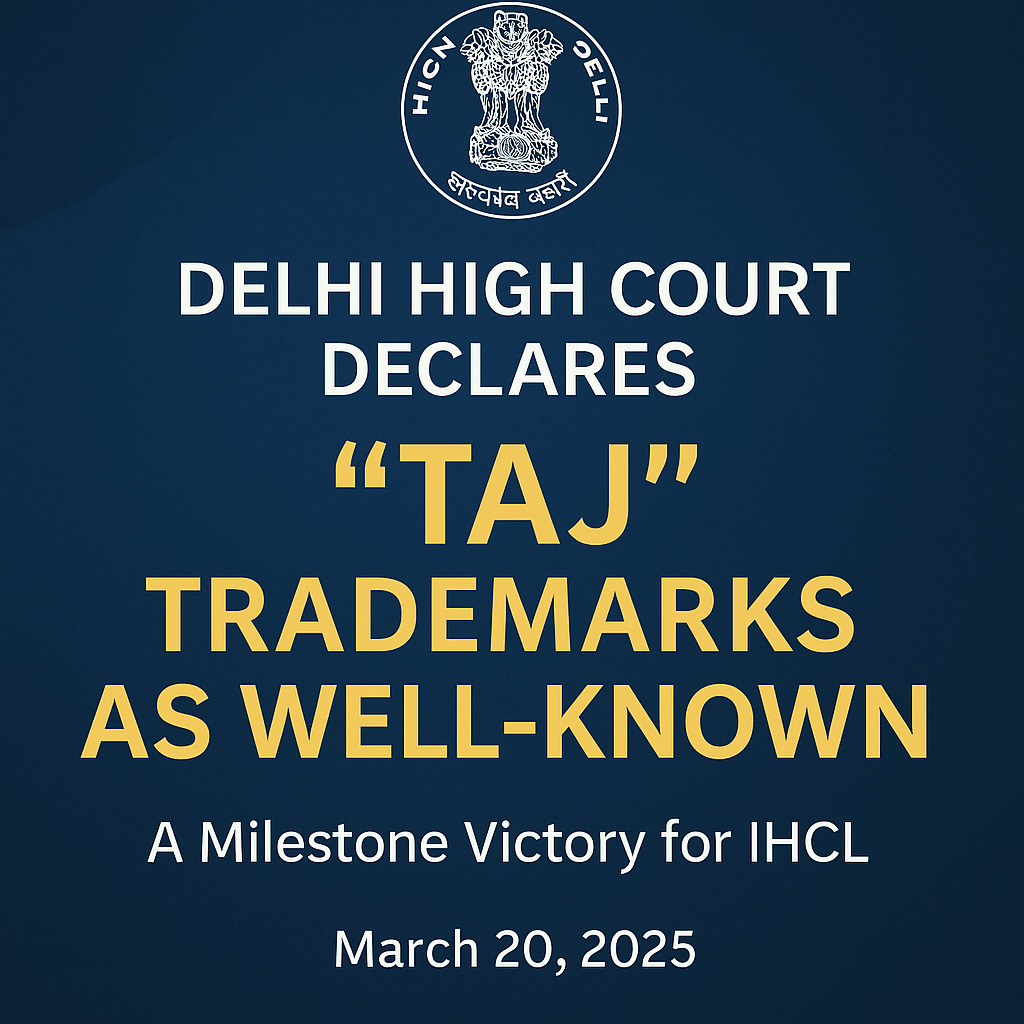View News
Delhi-High-Court-Declares-TAJ-Trademarks-as-Well-Known-A-Milestone-Victory-for-IHCL

Delhi High Court Declares "TAJ" Trademarks as Well-Known: A Milestone Victory for IHCL
In a significant ruling that strengthens brand protection in India’s intellectual property landscape, the Delhi High Court on March 20, 2025, officially recognized the “TAJ” trademarks, associated with The Indian Hotels Company Limited (IHCL), as well-known trademarks under the Trade Marks Act, 1999. The verdict was delivered by Justice Amit Bansal, who presided over the case titled The Indian Hotels Company Limited v. Gaurav Roy Bhatt & Anr.
This recognition marks a pivotal moment for IHCL, a premier player in India’s hospitality sector, best known for operating the iconic Taj Mahal Palace Hotel in Mumbai, which first opened its doors in 1903.
The Background of the Case
IHCL approached the Delhi High Court seeking a declaration that its “TAJ” marks qualify as well-known trademarksunder Section 2(1)(zg) of the Trade Marks Act, 1999. The move was prompted by alleged unauthorized usage of the "TAJ" brand by certain individuals, which IHCL contended could deceive the public and dilute the brand’s longstanding reputation.
IHCL submitted that the "TAJ" trademarks—integral to its identity—have achieved immense recognition and goodwill not just in India but across the globe, warranting special legal status and broader protection.
The Court’s Evaluation Criteria
Justice Amit Bansal undertook a comprehensive review under Sections 11(6) and 11(7) of the Trade Marks Act, 1999, which lay down specific factors to determine whether a trademark qualifies as well-known. The Court acknowledged IHCL’s evidence and held that all relevant criteria were satisfied. Key findings included:
1. Public Recognition and Reputation
The “TAJ” marks have achieved exceptional brand recognition. The Court noted IHCL’s achievements, including repeated recognition by Brand Finance as “India’s Strongest Brand” in 2020, 2022, and 2023. The TAJ brand is synonymous with luxury, trust, and heritage in hospitality.
2. Duration and Extent of Use
Having been in continuous use since 1903, the “TAJ” marks represent over a century of legacy and excellence. The brand now operates across 130+ locations globally, serving as a testament to its enduring presence.
3. Promotion and Advertising
IHCL demonstrated a sustained and substantial investment in marketing and brand building. Promotional activities span traditional media, corporate social responsibility (CSR) initiatives, and an expansive digital footprint, including millions of followers across social media platforms.
4. Trademark Registrations
IHCL has secured over 100 trademark registrations for the “TAJ” brand across various jurisdictions. This international and domestic registration strategy further solidifies its claim to the marks and its proactive approach to brand protection.
5. Enforcement of Rights
The Court acknowledged IHCL’s track record of actively enforcing its rights, including previous successful legal actions against infringers. Such enforcement has helped preserve the brand’s exclusivity and consumer trust.
The Court’s Verdict
Justice Bansal concluded that IHCL met all the necessary criteria under Sections 11(6) and 11(7), stating:
"Accordingly, the plaintiff fulfills all the criteria set out in Section 11(6) read with Section 11(7) of the Act for declaring the TAJ marks as well-known trade marks in respect of hotels and other related services in the hospitality industry."
The Court issued a decree formally declaring the "TAJ" marks as well-known within the meaning of Section 2(1)(zg)of the Trade Marks Act, 1999.
Implications of the Judgment
For IHCL:
This recognition grants IHCL enhanced legal protection for its “TAJ” brand, even beyond the hospitality sector. With well-known status, IHCL can prevent misuse of the name “TAJ” in unrelated industries that might cause confusion or dilute the brand’s distinctive identity.
For Indian Trademark Law:
The judgment sets an important precedent in Indian jurisprudence. It reinforces the principles that sustained brand usage, public recognition, and robust enforcement are critical to achieving the status of a well-known mark.
For Other Brands:
This case becomes a model for other companies seeking to elevate their trademarks to well-known status. It highlights the value of proactive brand management, strategic trademark registrations, and vigilant enforcement.
Conclusion
The Delhi High Court’s ruling is a landmark decision in Indian trademark law, recognizing the enduring legacy and global stature of the TAJ brand. For IHCL, it’s a monumental step in safeguarding one of India’s most prestigious hospitality names.
As global brands increasingly look toward India’s growing consumer market, this case underscores the significance of intellectual property protection and the powerful role of courts in preserving brand integrity.

